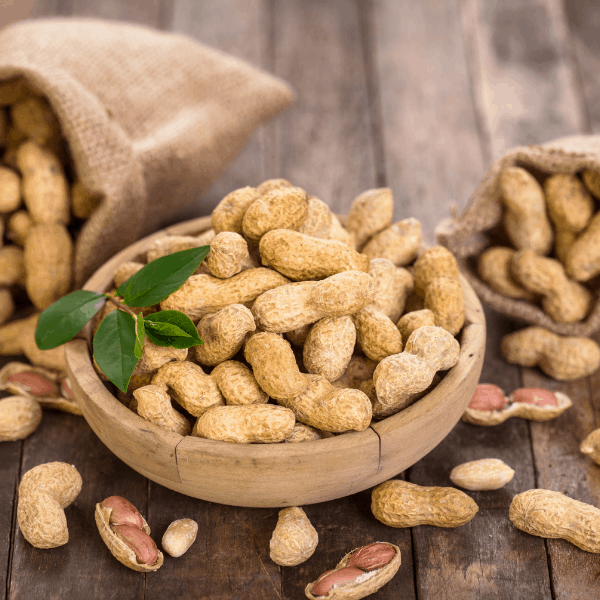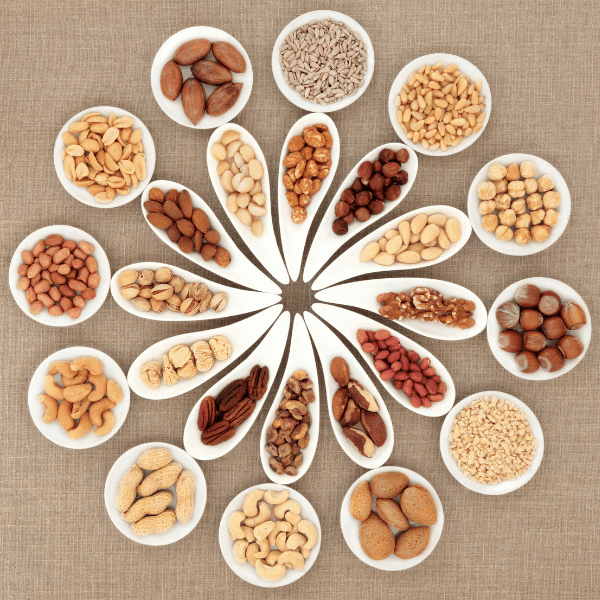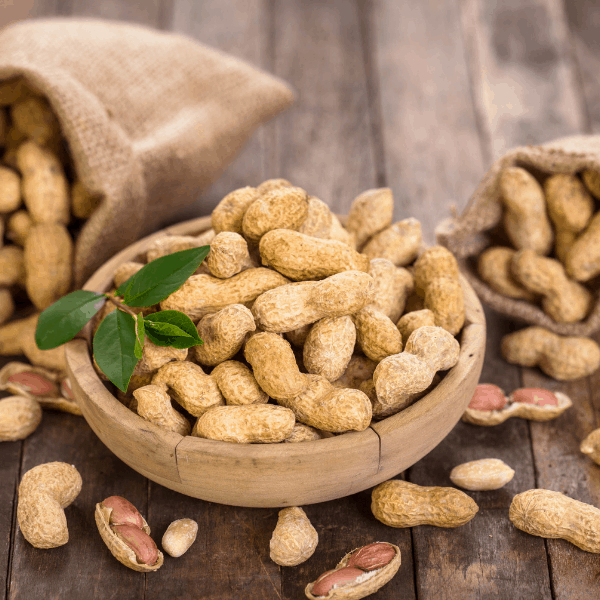Raw Peanuts: Nutrition Facts and Health Benefits
There is no debating that peanuts are one of the most popular food items worldwide. They are delicious, affordable, and extremely versatile. In addition to being excellent cocktail snacks, peanuts can be used to make a wide range of products such as peanut butter, smoothies, and even peanut oil.
Regardless of where you are in the world, there’s a high probability that peanuts are a part of your diet. But do you know how nutritious peanuts really are?
Where Do Peanuts Come From?
Before we go over their nutritional profile, let’s clarify the most common misconception about peanuts: Peanuts are not technically nuts.
The first thing you should know about peanuts is that they are scientifically not classified as nuts. The peanut is a legume crop like peas, lentils, and beans. This means that peanuts do not grow on trees, unlike almonds and walnuts, which are “real” nuts.
Raw Peanuts Nutritional Profile
Raw peanuts have a moderate amount of calories and fat. However, that doesn’t mean peanuts are bad for you, as they are also rich in protein and fiber.

Are Peanuts Healthy?
Peanuts in their raw form are a great source of healthy fats, protein, and fiber. A serving of peanuts also contains a significant amount of vitamins, potassium, phosphorus, and magnesium.
How Much Protein Is in Peanuts
Peanuts are an excellent source of plant-based protein. On average, they contain about 25 grams of protein per 100 grams of peanuts. That means a serving of peanuts provides around half of a person’s recommended daily intake for protein. While the amount of protein a person needs varies with age, gender, and activity level, it is recommended that people consume around 50 grams of protein daily.
Protein is essential for muscle building due to its ability to repair muscle tissue. For this reason, peanut products like peanut butter and peanut bars are often present in the diets of bodybuilders, athletes, and regular gym-goers.
Fat in Peanuts
Compared to other legumes, peanuts are high in fat. Because of their high-fat content (44-56%), peanuts are classified as oilseeds. In fact, a large percentage of the world’s peanuts are used for the production of peanut oil.
The fat in peanuts consists mostly of mono- and polyunsaturated fatty acids, which are considered the healthy type of fat. According to the American Heart Association, consuming unsaturated fats, as opposed to saturated fats, can benefit our heart health and cholesterol levels. However, peanuts also contain a small number of saturated fats, so it is best to eat peanuts in moderation.
Carbs in Raw Peanuts
With an average carb content of 15% their total weight, raw peanuts are relatively low in carbs. Peanuts also have a low glycemic index, which is a metric to determine how fast carbs enter your bloodstream after consumption. Having a low glycemic index, peanuts are an excellent dietary choice for people with diabetes.
How Much Fiber in Peanuts
Like many plant foods, peanuts are a great source of dietary fiber. One serving of peanuts contains about one-fourth of a male’s recommended fiber intake and one-third for women.
Fiber is an essential nutrient that promotes healthy weight, balanced cholesterol levels, and regular digestion. Fiber can also help prevent heart disease, stroke, and type 2 diabetes.
Peanut Vitamins and Minerals
In addition to being a good source of fats, fiber, and protein, peanuts offer many essential vitamins and minerals such as niacin, magnesium, and copper.
Peanuts are particularly abundant in vitamin E, which is commonly found in fatty foods. Vitamin E is a powerful antioxidant that helps fight off compounds called free radicals which damage cells throughout the body.
Peanuts are also one of the richest sources of biotin. This vitamin, commonly found in other foods like eggs and bananas, helps with conditions such as hair loss, brittle nails, and nerve damage. Biotin is also an important vitamin during pregnancy.
Other vitamins found in peanuts include folate, manganese, thiamine, and phosphorus.

Salted Peanuts and Other Variations
Peanuts come in a variety of forms, including salted, roasted, and cocktail peanuts in their shells. Each type goes through different preparation processes, so they each have different nutritional profiles, health benefits, and risks.
Salted Peanuts Nutrition
If you opt for salted peanuts, you should know that dry-roasted nuts contain about twice the sodium than oil-roasted nuts. Salted, oil-roasted cocktail peanuts contain about 90 mg of sodium. In contrast, salted, dry-roasted peanuts may contain up to 190 mg. This is the result of manufacturers using more salt for dry-roasted peanuts, which contain less flavor.
Raw Peanuts in Shell
Peanut skin contains antioxidants and other essential nutrients. While not the tastiest, raw peanuts in their shell or skin are by far the healthiest choice when it comes to peanuts. Where possible, choose raw peanuts in shell or skin to boost your antioxidant intake significantly.
What Are Peanuts Good For?
In moderation, peanuts offer a handful of health benefits due to their rich nutritional content. Adding peanuts to your diet may help maintain a healthy weight, manage blood sugar, and support heart health.
Maintain a Healthy Weight
Because they are full of fiber and protein, peanuts can help you feel satisfied without eating too much of them. Using peanuts to replace sugary snacks like chocolates can be beneficial in the long run, as studies have shown.
Manage Blood Sugar
With a glycemic index (GI) of 23, peanuts are an excellent option for people with diabetes or those at risk of developing diabetes. Nutritionists consider foods with a GI index under 55 as low GI foods, while foods with a GI above 70 are high-GI foods.
Support Heart Health
Due to peanuts having more unsaturated fats than saturated fats, they are better for the heart than other snacks with a higher proportion of saturated fats. Studies have found that eating a moderate amount of peanuts daily may improve heart health significantly.
Peanuts Risks and Health Concerns
As mentioned above, some types of peanuts are less nutritious than others. Avoid salted peanuts whenever possible, whether you choose Virginia peanuts, Valencia peanuts, or any other kind. Dry-roasted, salted peanuts have a high sodium content which can increase the risk of stroke, heart disease, and high blood pressure.
Do Peanuts Make You Gain Weight?
Because peanuts are high in fats and calories, eating too many may lead to slight weight gain. Consumer peanuts in moderation to efficiently benefit from all the nutrients and vitamins they can offer.
Peanut Allergies
Peanut allergies are one of the most common food allergies among the general population. It is estimated that 1% of the US population has a peanut allergy, though this number is thought to be higher among young children. Because of this, may parents choose to delay introducing their kids to peanuts until later in their childhood.
Bottom Line
Peanuts offer a healthier alternative to other popular snacks like chips, chocolates, or candies. They are rich in nutrients and vitamins, particularly healthy fats, fiber, and protein which can help manage heart health and promote a healthy weight. However, peanuts should be consumed in moderation as they also contain saturated fats, which can be harmful if taken in large proportions.











